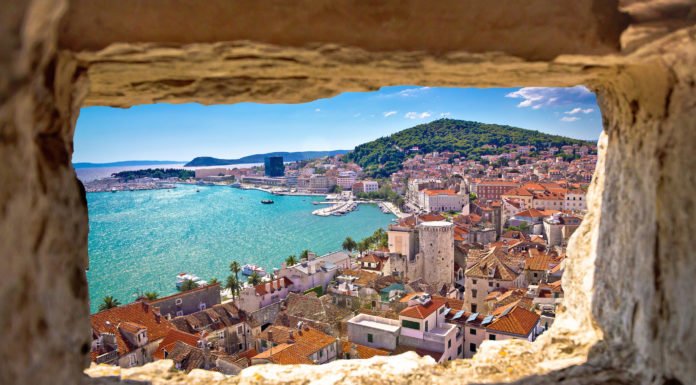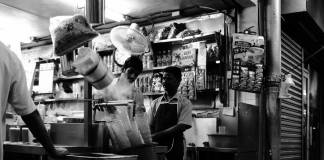Under the cobalt glory of the Algarve sky, I arrived in Olhão, Portugal in the sweet summer of 2019. My affection towards the town and my wish to go back there is echoed in the work of fiction written below.
The names and the events are completely made up but not the landscape.
If there is a moment that Monsieur Châteauroux feels calm and hates the world less, this could be the hour. He is alone. A solitary seagull flies overhead. Sitting on the white powdery sand, he watches the creature in its perpetual sky worship, as the waves lap languidly along the shore. “Must be nice up there” he calls out.
For the first time in a long while, the weariness that has plagued and tormented Monsieur Châteauroux for days has quietly melted.
Dawn is about to become day. As the early morning sun lights up the cloudless sky, Monsieur Châteauroux for several minutes looks up and continues to admire the custodian of the sky. It soars higher and beyond, until he can no longer see its outline. It sneaks like a ghost, as if its existence may have only been a figment of his imagination. “Dammit!” bashing his fist on the sand.
He picks up a stone, apparently the only one he could find, and with the full strength of a seventy year old man, Monsieur Châteauroux hurls the object as far as he can, regaining his composure just as the stone regains its place on the bottom of the ocean floor where it once belonged. He listens silently to the waves, soft and silky. He listens again. To him, it’s no longer a sea. It’s no longer an endless immeasurable volume of water, but the voice of life, the voice of someone he once knew. Soft. Silky. Yet gone.
Colette loved days like this. Monsieur Châteauroux recalls. Quiet and calm. It’s as if the world just woke up and suffered from a mild form of amnesia.
They met seventeen years ago on a lovely autumn morning by the square, close to the café which he used to frequent. You could say that it was love at first sight for him. Colette possessed a kind of charm that can bewitch a man or any man in a way that makes him think she knows the depths of their dreams and desires. Her feline eyes gave an impression of sexiness at the same time of mischief. She was affable, quick witted and when she laughed, she purred and that’s what Monsieur Châteauroux loved most about her.
Small talk blossomed into sweet promises. He was attentive and pampered her in a way as all French men are meant to, a barrage of seduction – food, charm and je ne sais quoi. In a span of a week, Colette was happy to move into his one-bedroom pied-a-terre not far from where they first set eyes on each other. There in the leafy suburb southeast of Paris, Colette, remained and for the rest of her life never left Fontainebleau.
“It’s silly of me to wish you’re here.” He misses her. “It’s a sin to not think of you either.” That’s just human nature.
View this post on Instagram
A week ago, Monsieur Châteauroux found himself rushing back to his apartment from his prescribed morning run. He took out a bag and clumsily stuffed it with enough clothes to last for a few days with items he thought useful. It included a frazzled scarf, exhausted by five years of continued use, a pair of eyeshades and earplugs, extra socks, a bathing suit and his white espadrilles. He also packed a razor, a tube of cortisone cream for his oppressive dermatitis and a mentholated camphor stick that he inhaled deeply from time to time to calm his nerves.
He plucked a photo of Colette from his nightstand, the one where she was seen sitting majestically on a deck chair, basking in the early morning light and grinning like a Cheshire cat. He yanked it out of its frame and inserted the memento inside a book that showed ‘Men Without Women’ on its cover. He placed the book on top and used it as press to shove everything flat inside the bag, now heavily swollen with his earthy possessions as he struggled to close it. He knew he needed to get away. Where? He didn’t know yet. When? Now.
Despite his haphazard plan of heading south, despite there being an ostensible goal of spending a week somewhere in seclusion or maybe even across the border should the need be; a consciously chosen destination that he imagined, he kept on going and pushed onward.
He drove for days across France, into Spain and all the way to Portugal only to reach the point where the land mass ended and a world of sea began. Only at that moment he decided to stop.
Perhaps it’s a case of a cosmic joke. A mysterious force that pulled and reeled Monsieur Châteauroux in and steered him toward the 18th century small fishing village with a name that sounded like a sigh. Olhão, a lands end in the Algarve region on the southern tip of Portugal. Although it wasn’t exactly what he first imagined, he nonetheless took pride to have gotten as far away as possible from Fontainebleau.
Olhão smells like a rush of iodine. The purest of its kind – the rising surf, waves breaking and the white frothing foam that forms after, the saltiness that stings the eyes, the briny spray that clumps the hair, the saliferousness, refreshing and sedating. It’s a distinctive fragrance that the town wears and to which the locals cherish.
In the old bairro, cubist tenements stand, derelict yet dignified while some are being spruced up and restored to their former glory. They have that northern African look about them one sees in Morocco or Tunisia. As Algarve’s biggest fishing port, Olhão is a relatively small town.
View this post on Instagram
A glimpse of its layered past reveals civilizations that turned up, flourished, left and eventually receded. First came the Celts, then the Phoenicians with their expertise in the fish salting industry and were soon replaced by the Romans. Following on, were the Sybaritic Umayyads from the Middle East only to be succeeded by their distant cousins from North Africa. If there’s one thing that convinced Monsieur Châteauroux in his belief to be cured from his misery was the event that happened during the Peninsular War.
Perhaps Olhão is really the kind of place that could relieve him of his French malaise. After all, this is where his ancestors together with Napoleon marched and fought against the strength of a unified army of British, Spanish and Portuguese only to be defeated at the outskirts of town. He hopes to put an end to the persisting self-inflicted torment. Win over his personal war in the same town, in the same way it had witnessed the victors of that dreadful five-year conflict.
His room overlooked the Ria Formosa, a UNESCO-protected lagoon surrounding Olhão. He was grateful for the simplicity of things. There were no grand attractions in the town except for the port itself that buzzed with life and the market, which showcased the gifts of Poseidon. Octopus, shrimps, lobsters, tunas, mussels, urchins, clams, eels and other bounties of the sea, all glistened and jolted on the display stand.
A train track dissected the old bairro from the gentrified part of town. The ancient cobbled lanes often lead to narrow passages or blind alleys or to a small square where locals read the paper, sipped their coffee and scratched lottery cards opposite a church bearing a chapel on its rear where they prayed piously for big time luck and for loved ones at sea.
After spending two days on the mainland, Monsieur Châteauroux took a ferry and sailed across the lagoon to one of the islands that shielded Olhão from the brute force of the Atlantic. He reached Armona, adrift in the sea and suspended in time.
There were no cars on the island. The only means of transport was on foot or by bicycle – the standard two-wheeled types and quad bikes used to carry goods, move materials for construction and refuse disposal. To Monsieur Châteauroux’s calculation, there were six restaurants, three shops that sell only the essentials including alcohol, one café and one beach bar. Life took an even slower pace here. One was required to give up the personal clock, abandon the urban ways of measuring time and get accustomed to the ways of the island.
View this post on Instagram
He rented a fisherman’s hut, the size of his narrow garage in Fontainebleau, owned by the same family who runs the inn on the mainland. That night, Monsieur Châteauroux dreamed the same dream he dreamt for many nights for it was his nature to dream.
In his highest point of REM sleep, he revisited the wonderful times he and Colette spent together in the garden that they nurtured and attended. They smelled each flower that bloomed as Tchaikovsky’s Piano Concerto No.1 played in the background. It was their favorite obra maestra.
Just before the music reached its climax, the melody changed to Symphony No.6 and scenes of their silly quarrels would unravel. Like when Colette suspected him of seeing another person. She would sniff his clothes to find any slight evidence of someone else’s perfume, a scent that didn’t belong to him. He would accuse her of being too paranoid and scream and sometimes slap her. Colette would hiss back and counter him on being too controlling, landing few scratches on Monsieur Châteauroux as evidence of her anger.
How ironic that Tchaikovsky called this symphony ‘Pathetique’. The music mellowed and switched to Piano Concerto No.1 and everything was wonderful and sweet again. They would make up quickly and forget things as if the fight had never happened. The music stopped. The curtain closed. It was all dark again.
Monsieur Châteauroux wakes up the next morning at dawn and emerges from his hut and reverie. He steps outside and wanders along the empty beach. A towel drapes on his left shoulder while his right arm clutches a book. He then finds a comfortable spot where he spreads his towel and settles to watch the sleepy ocean soon to be buffeted by high-powered winds come midday.
He is alone just like the seagull that hovers above him. How strange for them to have shared such a fate. “Must be nice up there” he calls out, not to the seagull, but to Colette who probably is somewhere above. “Dammit!” he calls out again, not because he can no longer see the bird, but because only then it hits him, that he, in his seventy years of existence, is now truly alone. The light streams in, gentle and mellow. He picks up his book to momentarily change the mood and resumes to where he last left off. Page 221. It reads:
Suddenly one day you become Men Without Women. That day comes to you completely out of the blue, without the faintest of warnings or hints beforehand. No premonitions or foreboding, no knocks or clearing of throats. Turn a corner and you know you’re already there. But by then, there’s no going back. Once you round that bend, that is the only world you can possibly inhabit. In that world you are called “Men Without Women.” Always a relentlessly frigid plural. – HARUKI MURAKAMI
Colette became deaf in her old age. Her eyesight deteriorated as well and eventually went blind, though she hasn’t lost her sweet smile, a faithful expression of her character. Her memory outlived the high drama of her youth and twilight years. That fateful day when Monsieur Châteauroux went out to mail a letter to his solicitor, he left the house and forgot to lock the terrace door. Colette, deprived of her senses, fell from the terrace three floors down, cracked her skull, broke a rib and died on the spot.
“It’s silly of me to wish you’re here.” Monsieur Châteauroux lets out a big sigh. “It’s a sin to not think of you either…oh you stupid cat.”
Do you plan on taking a trip to Olhão soon? Or have you already visited this quiet side of Algarve? Which destinations in Portugal are you looking forward to visit? Would love to know in the comment section below.
This second installment, ‘The Short Happy Life Of Collette’, is one of three fiction short stories that Flying Baguette is curating. For more, kindly check the links below.
BUTTER MY BAGUETTE
This website made of love strives to produce FREE CONTENT.
Help me tell more stories and keep this website free of any advertisement by supporting Flying Baguette in inspiring more people and connecting you with other cultures and communities around the globe. Donate a little or as much as you can afford to keep the magic of Flying Baguette going for years to come. Share your support through the icons below ⬇️














The whole narrative is charming, despite the ending. As a Portuguese who visits the Algarve a lot and is especially fond of the Ria Formosa, I have to say that the descriptions are perfect. From the historical context to the sensory, where the smells are described, those smells so characteristic of the fishing villages on the Portuguese coast.
For a moment I left my office on the west coast of Portugal and was transported to the south coast of the country 🙂
I love your writing style, a true novelist at heart as well as a travel blogger.
the story was quite dreamy and I took it as a semi travel story – but the ending was a shock and not what I was expecting – you captured me well!
I’ve been pulled emotionally in many directions lately and today was one of them days. Your story really transported me to Olhao and took my thoughts for a couple of minutes away from Brussels. Your writing is so magical and captivating, I agree with Pam, you should consider a book with short stories or enter these into a writing competition.
Carolin | Solo Travel Story
You should really write a book. I am always captivated by your writing – both in the plot and in the setting. Portugal sounds pretty amazing. It captured my imagination and my heart. Great writing.
I loved reading this short story but I wasn’t expecting the tragic revelation, even though you had foreshadowed it skillfully. And I loved how you wove the wonderful and evocative setting of Olhao into the narrative. We have never visited this part of the world but from your description, it looks like a place we would love to explore. And even, perhaps, find some holiday feline friends.
I was not expecting the twists and turns of this story, which kept me intrigued until the end. What a beautiful location for a story too, and I really liked your description of a “name that sounds like a sigh ” which had me uttering the name over and over to see how true that was. A beautifully written story for a wonderful town, how I adore the idea of just getting in the car and driving until I find such a place
What a charming story that evokes all kinds of memories of the Algarve and of loves passed. Your descriptions were evocative and allowed me to feel I was right there in the little fishing village. I loved how Colette was revealed to us, yet still eluded me until the end. Bravo.
What a wonderfully told story and definitely not the twist I expected! So much imagery and beautiful detail.
This is beautiful Jan. you’ve captured the essence of reflection perfectly, and the loneliness of being older and alone. Love reading your short stories.
What a wonderful yet poignant story. Was wondering what happened to Colette and was a little heartbroken at the end
I love your way of telling these stories and what a lovely little place on the Algarve this seems. Really feel I was transported there
Thank you Hazel and Richard 😉 Happy to know that I managed to take you both to the Algarve albeit short and quick. I hope you both can visit Olhão too 😉
Another wonderful story Jan which transported me back to my much-loved days in Portugal. I feel like Monsieur Chateauroux, missing my doggie like he misses Colette.
Thanks Wendy 😉 glad I was able to lend you a ticket back to Portugal. I have a feeling that when it’s safer to travel and the world opens up again, Portugal will surely be in your list of top 10 places to revisit.
Another great short story, Jan. I admire how you manage to distil the essence of love into just a few seemingly random aspects like the purr Colette makes when she laughs. I think the story fits nicely into its setting in that little fishing village in the Algarve. Your Murakami quote reminded me that I need to pick up one of his great books again one of these days. He’s such a unique writer. I see him in the same group as Milan Kundera and F. Scott Fitzgerald.
Thank you very kindly to you both 😉 It had taken me several tries to weave Colette’s endearing qualities and I’m so glad it worked out well. I can only hope that I also managed to put a smile on Murakami in the same way I did to you both. Actually Milan Kundera’s The Book of Laughter and Forgetting has been poking me for awhile now and you just made me grabbed it. I’d better catch up on my reading 🙂 Happy travels and keep safe!